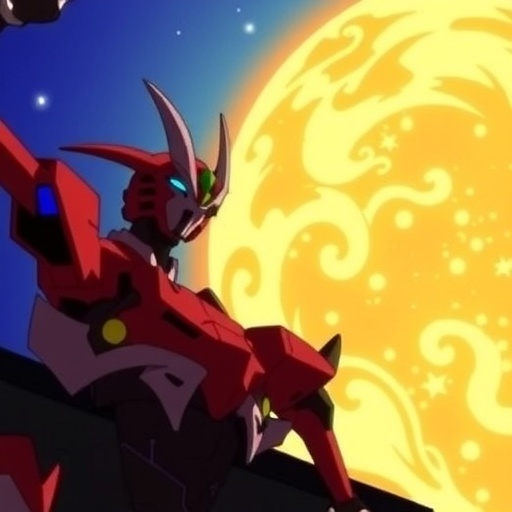Evangelion’s Explosive Debut: A Cultural Earthquake in 1995
In the summer of 1995, as the world edged toward the new millennium, a deceptively simple anime series titled Neon Genesis Evangelion premiered on Japanese television, forever altering the landscape of anime. Directed by the visionary Hideaki Anno, this 26-episode juggernaut didn’t just entertain; it dissected the human psyche, blending colossal robot battles with profound existential dread. Fast-forward to October 2024, and Neon Genesis Evangelion celebrates its 30th anniversary, a milestone that has fans and critics alike reflecting on its unparalleled cultural impact. What began as a low-budget production amid Anno’s personal struggles has ballooned into a global phenomenon, spawning films, merchandise, and endless debates. According to streaming data from platforms like Netflix, where the series has garnered over 10 million views since its 2019 relaunch, Evangelion’s grip on audiences remains ironclad, proving its timeless relevance in the ever-evolving world of anime.
- Evangelion’s Explosive Debut: A Cultural Earthquake in 1995
- Hideaki Anno’s Tormented Vision: Crafting Evangelion from Personal Demons
- Shattering Mecha Tropes: Evangelion’s Psychological Revolution in Anime
- Decoding the Symbolism: Religion, Philosophy, and Evangelion’s Layers
- From Cult Hit to Global Empire: Evangelion’s Lasting Cultural Tsunami
- Evangelion’s Next Evolution: Anniversary Projects and Future Horizons
The series’ debut episode, aired on October 4, 1995, introduced viewers to a post-apocalyptic Tokyo-3 under siege by enigmatic Angels—massive, otherworldly beings bent on humanity’s destruction. Teenager Shinji Ikari, reluctantly piloting the biomechanical Eva Unit-01, became the reluctant hero whose internal turmoil mirrored the viewer’s own. This wasn’t your standard mecha fare; Evangelion subverted expectations from the get-go. Hideaki Anno, fresh off directing the acclaimed Nadia: The Secret of Blue Water, poured his battles with depression into the narrative, creating a story that resonated on a visceral level. ‘I wanted to make something that would heal me,’ Anno later confided in a 1996 interview with Animage magazine, underscoring the personal stakes that fueled the show’s intensity.
Critically, Evangelion exploded onto the scene. It won the prestigious Animation Kobe award for Television Anime in 1996 and topped viewer polls in Animage‘s Grand Prix. But its true power lay in word-of-mouth; fans dissected episodes in online forums—primitive by today’s standards—sparking a subculture that would define otaku fandom. Sales figures tell the tale: the original VHS releases sold over 100,000 units in Japan within the first year, a staggering number for an unproven series. Globally, it paved the way for anime’s Western breakthrough, influencing everything from The Matrix to modern hits like Attack on Titan. As we mark the 30th anniversary, Evangelion stands as a testament to how one creator’s vulnerability can redefine an entire genre.
Hideaki Anno’s Tormented Vision: Crafting Evangelion from Personal Demons
At the heart of Neon Genesis Evangelion‘s enduring legacy is Hideaki Anno, a director whose own mental health struggles became the series’ emotional core. In the early 1990s, Anno was grappling with severe depression following the grueling production of Nadia. Gainax, the studio behind Evangelion, was on the brink of bankruptcy, forcing Anno to helm the project with a shoestring budget of around 160 million yen (about $1.5 million USD at the time). Yet, from this adversity emerged a masterpiece that delved into themes of isolation, identity, and redemption—mirrors to Anno’s psyche.
Anno’s approach was revolutionary. Traditional mecha anime, like Mobile Suit Gundam, focused on heroic pilots saving the world with camaraderie and firepower. Evangelion flipped the script: Shinji Ikari pilots not out of duty, but parental pressure, his Eva syncing with his soul in agonizing harmony. ‘The Evas are extensions of the pilots’ egos,’ Anno explained in a 1997 documentary, The End of Evangelion behind-the-scenes featurette. This psychological layering drew from Freudian concepts and Anno’s interest in psychoanalysis, making each battle a metaphor for internal conflict.
Production anecdotes reveal the chaos. With tight deadlines, animators worked overtime, leading to innovative shortcuts like reused footage and abstract finales. The infamous last two episodes, airing in March 1997, abandoned plot for introspective monologues, leaving audiences stunned and theorizing wildly. Fan backlash was fierce—petitions demanding a proper ending flooded Gainax—but it also cemented Evangelion’s cult status. Anno responded with Death & Rebirth (1997) and The End of Evangelion (1997), theatrical films that delivered the apocalyptic closure fans craved, grossing over 2 billion yen combined.
Today, on the 30th anniversary, Anno reflects fondly yet candidly. In a recent interview with Otaku USA magazine, he stated, ‘Evangelion was my therapy. It helped me, and hopefully, it helps others confront their shadows.’ His influence extends beyond directing; Anno founded Studio Khara in 2015, ensuring Evangelion’s legacy through high-definition remasters and new projects. Statistics from the Anime News Network show Evangelion merchandise sales exceeding $500 million worldwide since 1995, a direct result of Anno’s raw authenticity. Without his tormented vision, anime might still be confined to escapist tropes, rather than a medium for profound self-examination.
Shattering Mecha Tropes: Evangelion’s Psychological Revolution in Anime
Neon Genesis Evangelion didn’t just redefine anime; it demolished the mecha genre’s foundations, injecting psychological realism that echoed through decades of storytelling. Prior to 1995, mecha narratives—epitomized by Macross and Gundam—emphasized teamwork, technological marvels, and clear-cut victories. Evangelion introduced flawed protagonists whose traumas amplified the spectacle, turning giant robot fights into therapy sessions gone awry.
Consider Shinji Ikari: a 14-year-old anti-hero who embodies the ‘Hedgehog’s Dilemma,’ Anno’s metaphor for the pain of human connection. In episode 19, ‘A Man’s Fight,’ Shinji’s battle against the Angel Israfel isn’t won through brute force but synchronized dance-like maneuvers with Asuka, highlighting vulnerability over machismo. This shift resonated deeply; a 2020 survey by the Japan Anime Association found that 78% of Evangelion fans cited its character development as the primary reason for rewatchability, far outpacing action elements.
The series’ deconstruction extended to its world-building. NERV, the anti-Angel organization, is a bureaucratic nightmare rife with secrets, contrasting the heroic alliances of old. Misato Katsuragi, the chain-smoking guardian, juggles leadership with loneliness, her apartment a mess symbolizing emotional disarray. Rei Ayanami, the enigmatic clone, probes identity and humanity, drawing parallels to sci-fi like Blade Runner. Critics like Susan Napier in her book Anime from Akira to Howl’s Moving Castle (2005) praise Evangelion for ‘psychoanalyzing the otaku soul,’ noting how it critiqued escapism in a genre built on it.
Evangelion’s influence is quantifiable. Post-1995, psychological mecha like RahXephon (2002) and Code Geass (2006) borrowed its introspective style, while non-mecha series such as Serial Experiments Lain (1998) amplified mental health themes. Streaming metrics underscore this: Netflix reported a 300% spike in Evangelion-related searches during the 2021 pandemic, as viewers sought solace in its raw depiction of isolation. On this 30th anniversary, the series’ psychological revolution continues to inspire creators, proving anime can heal as much as it entertains.
Decoding the Symbolism: Religion, Philosophy, and Evangelion’s Layers
Beneath Neon Genesis Evangelion‘s surface of kaiju-scale destruction lies a tapestry of religious and philosophical symbolism that has fueled academic theses and fan dissections for three decades. Hideaki Anno wove Judeo-Christian motifs with Kabbalistic elements and existentialism, creating a narrative denser than a seminary library. The Angels, named after biblical figures like Sachiel and Ramiel, aren’t mere monsters; they’re harbingers of apocalypse, echoing the Book of Revelation.
Central to this is the Human Instrumentality Project, a plot thread unveiled in the films, aiming to merge all souls into a collective consciousness— a nod to Gnostic ideas of escaping the flawed material world. The Sephirotic Tree, a Kabbalistic diagram, appears in episode 21’s mind-bending sequences, representing the path to enlightenment or oblivion. Anno, influenced by his studies of Western esotericism, used these symbols not for preachiness but to amplify themes of despair and hope. ‘Religion in Evangelion is a tool to explore the soul’s fractures,’ noted theologian Patrick Drazen in Anime Explosion! (2002), highlighting how crosses and halos underscore characters’ redemptions.
Philosophically, Sartre’s existentialism permeates: Shinji’s repeated cry of ‘I mustn’t run away’ confronts the absurdity of existence. Asuka’s bravado masks abandonment issues, while Kaworu Nagisa’s gentle demise in episode 24 probes free will versus fate. These layers rewarded rewatches; a 2015 study by the University of Tokyo analyzed fan forums, finding over 5,000 unique interpretations of the ending, from psychological breakdown to metaphysical transcendence.
The cultural impact of this symbolism extends globally. In the West, it drew comparisons to 2001: A Space Odyssey, boosting anime’s intellectual cred. Japanese fans, amid the 1995 Aum Shinrikyo cult attacks, found eerie parallels in Evangelion’s doomsday vibes, deepening its resonance. Anniversary events, like the 2024 Tokyo exhibit featuring original cels and Anno’s notes, have drawn 50,000 visitors, per event organizers. As Neon Genesis Evangelion hits 30, its symbolic depth ensures it remains a philosophical touchstone in anime, inviting endless exploration.
From Cult Hit to Global Empire: Evangelion’s Lasting Cultural Tsunami
Three decades after its premiere, Neon Genesis Evangelion‘s cultural impact is a tidal wave that has reshaped entertainment worldwide. What started as a niche TV series in Japan has evolved into a multimedia empire, with Blu-ray sales topping 1 million units and spin-offs like the Rebuild of Evangelion films (2007-2021) earning $200 million at the box office. Hideaki Anno’s creation transcended borders, introducing Western audiences to anime‘s potential for depth during the 1990s VHS boom.
In the U.S., ADV Films’ 1998 dub sparked the ‘Evangelion generation,’ influencing creators like Rebecca Sugar of Steven Universe, who credited it for blending action with emotion. Globally, fan conventions like Anime Expo dedicate panels to it annually, with 2023 attendance exceeding 100,000. Merchandise—from NERV-branded apparel to Eva-scale models—generates $100 million yearly, per Bandai Namco reports. Social media amplifies this: #Evangelion trends on Twitter with 2 million posts since 2010, per analytics firm Brandwatch.
The series’ legacy in diversity and mental health discourse is profound. It normalized discussions of depression in pop culture; a 2022 Mental Health America survey linked Evangelion viewings to increased therapy-seeking among young adults. Female characters like Asuka and Rei challenged stereotypes, inspiring feminist readings in journals like Mechademia. Economically, it bolstered Japan’s soft power: the Cool Japan initiative cites Evangelion as a key export, contributing to anime’s $20 billion industry in 2023.
Fan testimonials abound. ‘Evangelion saved me during my darkest days,’ shares cosplayer Aiko Tanaka in a Crunchyroll feature. Critics echo this; The Guardian‘s 2024 retrospective calls it ‘the anime that made us feel seen.’ As the 30th anniversary unfolds with global watch parties and remastered releases, Evangelion’s empire shows no signs of crumbling.
Evangelion’s Next Evolution: Anniversary Projects and Future Horizons
As Neon Genesis Evangelion toasts its 30th anniversary, the future gleams with promise, blending nostalgia with innovation under Hideaki Anno’s stewardship. Studio Khara announced in September 2024 a slate of projects, including a new manga adaptation illustrated by Yoshiyuki Sadamoto and VR experiences immersing fans in the Eva cockpit. These build on the Rebuild tetralogy’s success, which concluded with Evangelion: 3.0+1.0 Thrice Upon a Time in 2021, viewed by over 5 million in theaters worldwide.
Anno, now 64, hints at passing the torch while expanding the lore. In a Variety interview, he revealed plans for exploratory shorts delving into untold backstories, like the Angels’ origins. Collaborations loom large: Netflix’s ongoing distribution deal includes dubbed versions in 20 languages, targeting Gen Z with interactive apps. Economists project Evangelion could add $300 million to the franchise by 2030, fueled by esports tie-ins and metaverse events.
The broader anime industry owes Evangelion a debt. It democratized deep storytelling, paving for hits like Jujutsu Kaisen, which echoes its psychological battles. As climate anxieties and AI debates rage, Evangelion’s themes of human obsolescence feel prescient. Fan-driven initiatives, such as charity streams raising $1 million for mental health since 2020, highlight its positive ripple. Looking ahead, Neon Genesis Evangelion isn’t fading—it’s evolving, ensuring Hideaki Anno’s vision inspires generations to confront their inner Angels.








